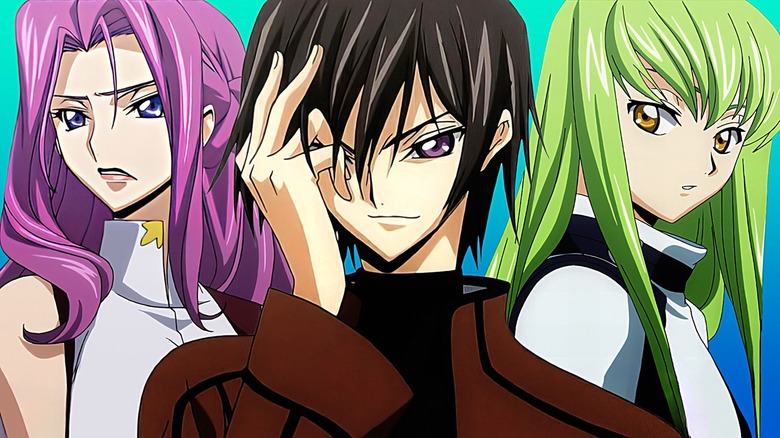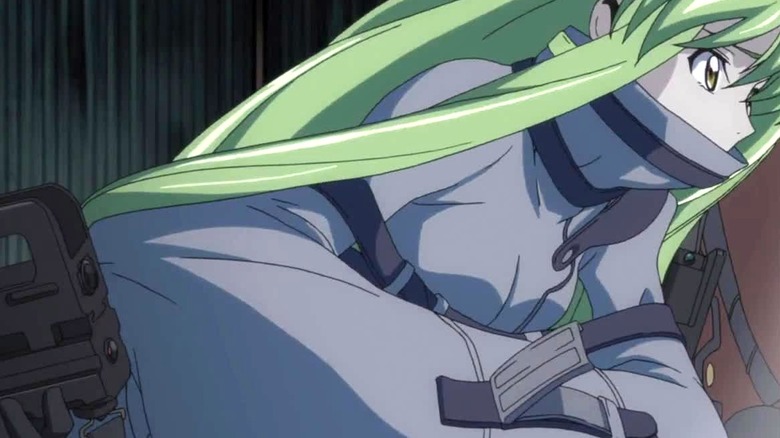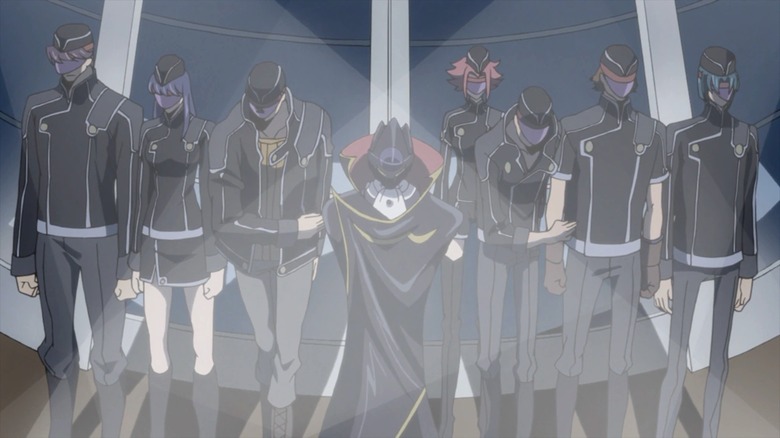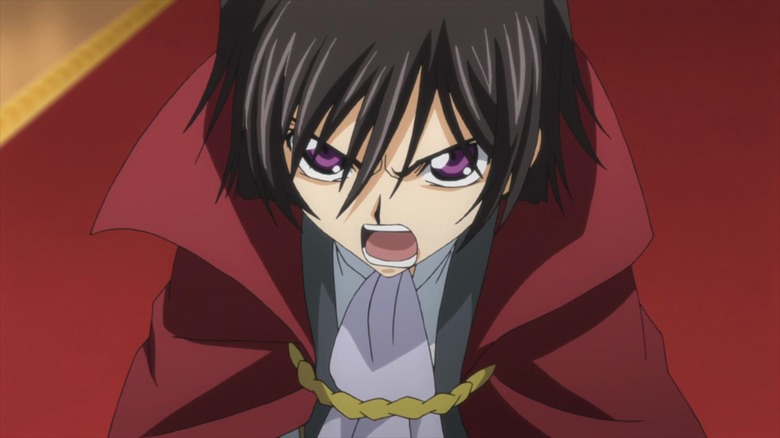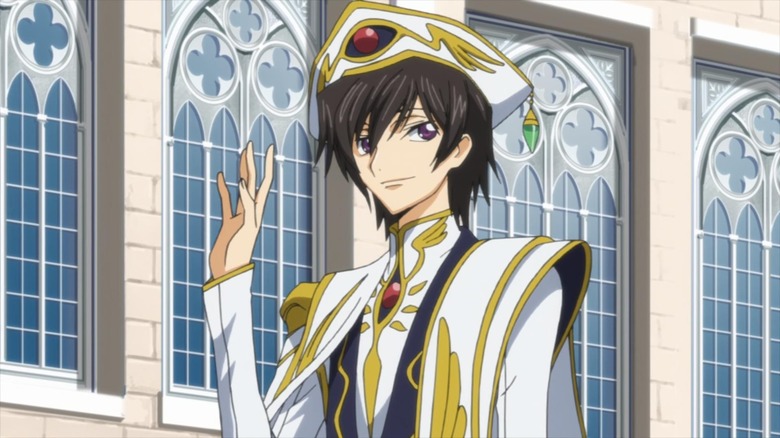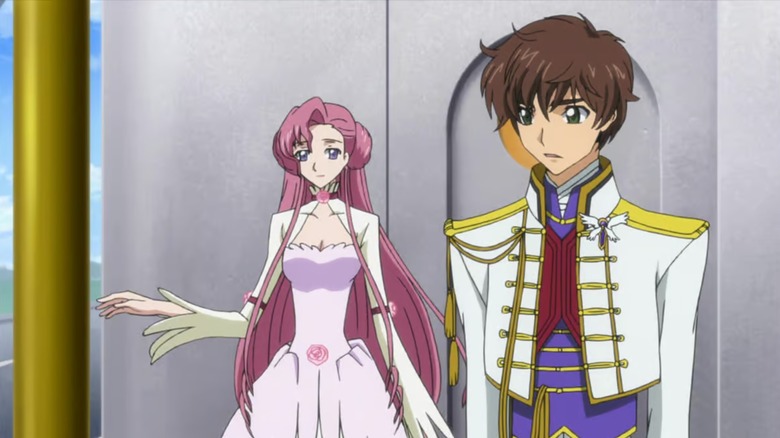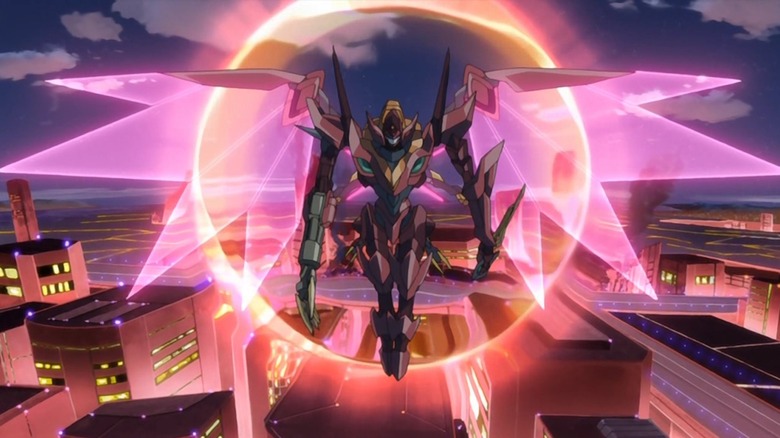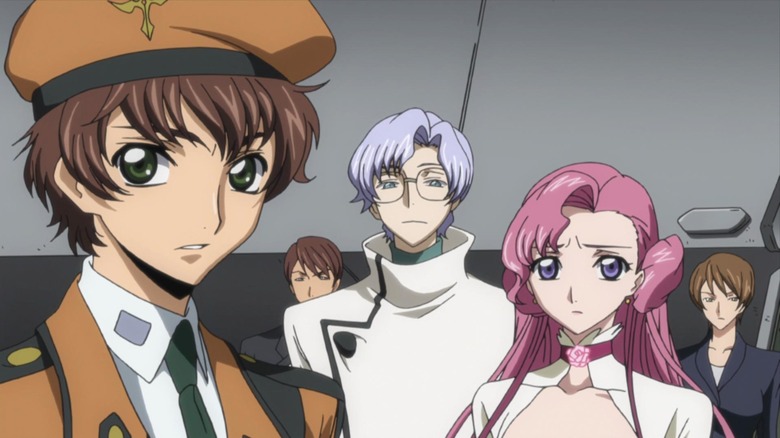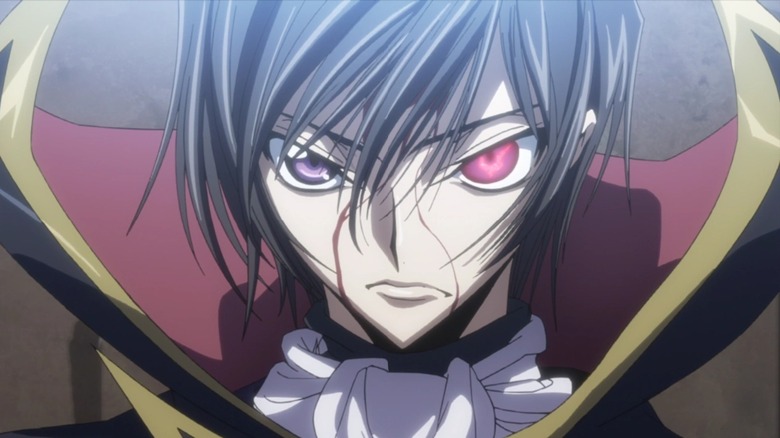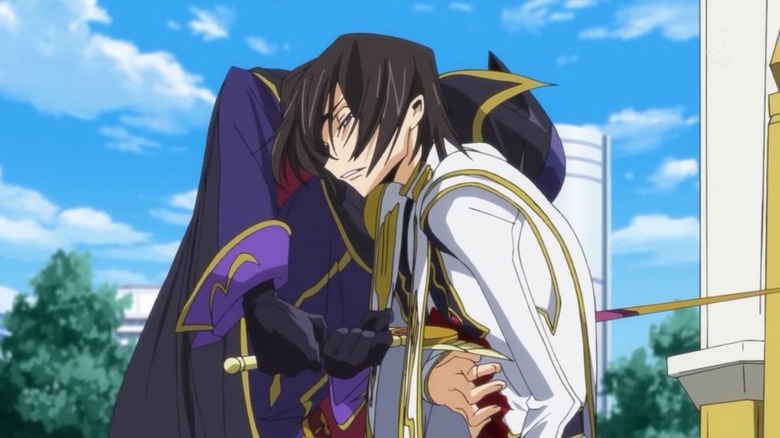9 Best Episodes Of Code Geass, Ranked
This post contains spoilers for "Code Geass: Lelouch of the Rebellion" and "R2."
Whenever someone asks for beginner-level anime recommendations, "Code Geass" almost always makes the list. The reasons behind this unanimous recommendation are simple: the story spans over two digestible seasons, incorporates the best aspects of psychological strategy and mech-focused action, and features complex, nuanced characters with believable motivations. More importantly, "Code Geass" makes us root for an antihero who hides behind layers of carefully constructed masks and is willing to go to any lengths to win a high-stakes game determining the outcome of a nation torn asunder by war.
Geopolitics plays a crucial role in shaping the trajectory of everyone's lives here, as the world — which is set in an alternate timeline — is divided into three superpowers wrestling for ultimate control. There's the monarchical Holy Britannian Empire, simply known as Britannia, the Chinese Federation that oversees most parts of Asia, and the Europa United, which controls parts of Europe and Africa. After Britannia champions a deadly weapon known as the Autonomous Armored Knight/Knightmare Frame, they use it to take over Japan and strip the citizens of their rights. Now assimilated under the Holy Britannian Empire, Japan is renamed Area 11, where every citizen is reduced to a non-entity existing to serve their colonizer's bidding.
This is quite an extensive setting, but things get even more complicated when we are introduced to friends Lelouch and Suzaku, who are seen witnessing Japan's invasion as kids. Although Suzaku seems a bit detached, Lelouch seems determined to obliterate Britannia someday, and the eventual reveal behind these disparate reactions gets the gears of this riveting story going. I will be ranking the best episodes from both seasons of "Code Geass" in terms of how impactful they feel from the perspective of narrative and character development, along with some really cool moments that helped define the look and tone of the anime series. However, I will not be including "Code Geass: Rozé of the Recapture," as it takes place after the events of the companion films and is still ongoing at the time of writing.
Without further ado, let us dive into some of the best episodes from this unforgettable anime.
9. Code Geass: Lelouch of the Rebellion: episode 1, The Day a New Demon was Born
This is the episode that started it all. After we get a succinct explanation of the socio-political landscape in Japan and the world at large, we are granted a microcosmic view of Lelouch's life at Ashford Academy. The game of smokes and mirrors has already begun, as Lelouch appears to be like any other student his age, except for a glimpse into his startling intelligence, which is conveyed through a chess game that reveals its true meaning much, much later. Against the backdrop of the mundane exploits of the students, there's palpable tension about the formation of a Resistance group, who are immediately branded as terrorists via the power of military propaganda. The episode also introduces us to the Resistance hijackers pretty early on, creating an interesting moral dilemma without furnishing us with the whole truth.
After a run-in with the hijackers, Lelouch comes in contact with what seems like a poison gas capsule that the hijackers stole from Britannia, who turns out to be none other than C.C. (pronounced C2). Of course, C.C. is the catalyst for Lelouch's arc going forward, as she grants him the titular ability, Geass, a supernatural power that binds the user in a contract where "the power of the king" condemns them "to a life of solitude," meaning that the ability comes with life-altering repercussions. As every Geass manifests in different ways, Lelouch's ability is the "Power of Absolute Obedience," which allows him to command anyone with direct eye contact, like an act of compulsion with extra steps. After gaining this ability on the brink of death, we witness Lelouch use it for the first time — a moment that is the definition of a power trip, both dangerous and exhilarating, making it clear that there is more to Lelouch than meets the eye.
8. Code Geass: Lelouch of the Rebellion: episode 8, The Black Knights
It is tough to rank these episodes as almost every entry reveals something intrinsic to Lelouch's motivations or adds to our understanding of the shifting allegiances that shape the central events. However, "The Black Knights" is undoubtedly a highlight in the first season; it positions Lelouch as a divisive figure will willing to do anything — both traditionally "right" or "wrong" — to further his moves in the lengthy game of chess he's playing. After a breakaway group from the Japan Liberation Front takes a hotel and its occupants hostage, including Lelouch's friends, he devises a strategy to rescue them. However, this effort is far from strictly altruistic, as he takes advantage of the precarious position Cornelia finds herself in. This episode also highlights Suzaku's skewed worldview, where he is more than happy to further his position as an Honorary Britannian pawn, bolstered by a perception of heroic sacrifice that comes at the cost of personal safety and integrity.
The contrast between Suzaku's intrinsic, self-effacing heroism and Lelouch's strategic, holier-than-thou vigilantism is in full display here, etched out in visual differences between the former's white Lancelot Knightframe and the latter's Order of the Black Knights. Lelouch's proclamation, "To those with power, fear me. To those without, seek me," appears balanced enough on the surface, but isn't, as he is driven by vengeance and the need to assert his ability to lead without fear and topple Britannia at any cost. Ironically, as someone with inordinate power (due to his public position and wielder of the Geass), his declaration feels hollow and begins to paint a picture of hypocrisy that will come to define his stance throughout his arc. And oh, this episode also solidifies our collective hate for Nina. If you know, you know.
7. Code Geass: Lelouch of the Rebellion: episode 7, Attack Cornelia
Every time you think you've seen the extent of Cornelia's ruthlessness, she leans harder into her ability to stun the smartest man in the room. In "Attack Cornelia," the primary objective for Britannia is to spring a trap for Zero, who has declared himself a twisted savior of the people and dared to challenge the colonizer regime. Viciously clearing out a resistance cell, Cornelia baits Lelouch at the Saitama Ghetto, and despite being the smarter tactician on paper, he falls for it. There's a kernel of arrogance that has been brimming inside him for quite a while, to the point that he believes himself to be invincible, and this sentiment is mixed with a desperation for instant change. He is so confident that he can outsmart Cornelia that he fails to factor in the real-world root-level issues that might not work in his favor and is almost cornered until C.C. dons Zero's garb to distract the troops.
Instead of learning from his mistakes, Lelouch blames it on the fractured resistance, vowing to work on something grander, which lays the foundation for the Order of the Black Knights in the next episode. Although Lelouch does need something bigger to bank upon, this episode exposes his inherent strategic flaws, which, despite being driven by cold logic, are tinted with narcissistic idealism. His penchant for theatrics is also to be noted, as he refuses to be understated at every turn, demanding that the attention is pinned on his actions, which anticipates the hostage rescue mission in the next episode. He also makes the mistake of underestimating Cornelia, who absolutely has no limits when it comes to bending the rules of morality, and the fact that she accurately assesses Lelouch's personality to draw him out proves that her plan would have succeeded, had C.C. not intervened.
6. Code Geass: Lelouch of the Rebellion R2: episode 22, Emperor Lelouch
So, a whole lot happens before we reach this narrative juncture, but "Emperor Lelouch" is a great episode. It presents Lelouch at the pinnacle of true power, where he is finally able to begin his reformation of Britannia. His deep hatred for the aristocracy (despite being a part of it) leads him to abolish it altogether, along with the dehumanizing Area system that categorizes humans as pawns instead of people. Moreover, Suzaku comes into clutch here, expertly decimating The Knights of Rounds in his Lancelot Albion (we love Spinzaku and never tire of the move), killing Bismarck Waldstein of all people. Lelouch is moved by his "extraordinary" willpower and calls him "a warrior like no other," marking a significant turning point in their complicated and evolving relationship.
Lelouch also makes a prominent power move by declaring to join the U.F.N. and immediately challenging the other members by positioning Suzaku as a hired muscle when they propose a limit to his authority. This is messy, convoluted politics at display here, and it takes a darker turn with Schenizel decimating the Britannian capital. However, the most hard-hitting reveal comes towards the end, leaving us to collectively wonder "How the heck is Nunnally still alive?" (although those with a penchant for detail will already have figured out this development and its impact on Lelouch's rise to power). Apart from this shocking revelation, this episode is chock-full of cool-looking moments, ranging from Lelouch's majestic aura to Suzaku piloting his Lancelot Albion (which, somehow, manages to look even better). Also, we must end this entry with an obligatory ALL HAIL LELOUCH, I don't make the rules.
5. Code Geass: Lelouch of the Rebellion: episode 22, Bloodstained Euphy
This is an absolutely gutting, horrifying episode. Euphemia, who is one of the few characters in the series who can be described as "pure," is put in an impossible position by an unwitting Lelouch, who isn't aware that his Geass can push people to such extremes. The less said about the episode the better, as it is a gut-churning visual spectacle that epitomizes tragedy, wherein an innocent person commits the unthinkable: targeted mass murder. What starts as a political discussion during a commemoration ceremony spirals into pure horror territory when Lelouch provokes Euphemia by stating something ludicrous, but it comes to pass in the most brutal manner.
Up until this point, Lelouch, despite his flaws, seems to be in control of his Geass, but this singular moment where he loses control underlines the pitfalls of such god-like powers and how easily they can be used to erase ethnic groups in the wrong hands. Worse still, Lelouch uses this as an opportunity to capitalize on the situation, which makes the events even more uncomfortable to watch. "Bloodstained Euphy" succeeds in making viewers squirm, prompting us to feel heartbreaking empathy for Euphemia, disgust for the circumstances revolving around her actions, and disdain for Lelouch when he uses this as an entry point for The Order of the Black Knights within the destabilized power hierarchy.
4. Code Geass: Lelouch of the Rebellion R2: episode 18, Final Battle Tokyo II
There are many great battle-centric episodes to choose from, and some of the most effective confrontations in the series happen without any violence involved, but "Final Battle Tokyo II" is the culmination of both sentiments. This is the deciding battle for Tokyo, with Lelouch/Zero commanding the Black Knights to capture his own sister, Nunnally (which is cold, even for Lelouch), and Suzaku threatening him with the F.L.E.I.J.A. bomb to thwart him. However, Lelouch is unbothered, completely uninterested in dealing with someone he does not trust at all, and calls his bluff. In the background, the death of a Black Knight triggers an unavoidable chain of events and a rescued Kallen takes control of the Guren SEITEN Eight Elements (and she looks as badass as ever), which she uses to save Zero.
An epic Kallen vs. Suzaku fight is one of the centerpieces here, with the odds severely stacked against the latter. Yet, Suzaku is unwilling to resort to unsavory means to attain victory. Although Suzaku's motivations and allegiances fluctuate throughout "Code: Geass," he is a man of principle, at least to the extent one can be in a world so torn apart by war and political subterfuge. However, fate, along with individual choices, have an ironic way of manifesting repercussions, leading to one of the most heartbreaking events in the series: Lelouch's command to "LIVE" kicking in at the verge of defeat, Suzaku detonates the bomb, leading to a horrifying catastrophe that razes the Tokyo Settlement to the ground. A profoundly somber moment that underlines cause and effect, and how some things are always beyond control in war.
3. Code Geass: Lelouch of the Rebellion: episode 7, I Order You, Suzaku Kururugi
This is the inception of the chain of events that eventually led to the Tokyo Settlement bombing, although none of the parties were aware that their actions would have such tragic, horrifying consequences. Lelouch, determined to defeat Suzaku, hatches a plan to capture him and his Lancelot at a Britannia military base on Shikinejima while refusing Diethard Reid's suggestion to assassinate him. Although it is a solid plan, the Second Prince Schneizel el Britannia appears and orders that the island be bombed to sacrifice Suzaku (if it also means killing Zero).
When you evaluate the episode from a narrative point of view, there are better episodes to bat for, such as "The Grip of Damocles," where Lelouch confronts Nunally, and "Bloodstained Euphy," where a bloody massacre occurs due to an inadvertent Geass command, putting Lelouch in a unique place of guilt. However, my reasoning for choosing this episode is the ethical dilemmas present during Lelouch and Suzaku's showdown, where each party is convinced that their path is the correct one. Both of them are unmoving when it comes to convincing the other, and they're both guided by a sense of the past and the mistakes that define them, which becomes the defining core of the series until the very end. Before this inevitable fight, C.C. urges Lelouch to simply use the Geass on Suzaku, but he hesitates, attributing their bond and his pride as hindrances to this plan. However, these idealistic notions crumble when Schneizel's bomb is on its way to hit the island, forcing Lelouch to use the ultimate Geass command that makes Suzaku live.
2. Code Geass: Lelouch of the Rebellion: episode 25, Zero
This season 1 finale evoked mixed reactions in me when I first watched it. As brilliant as it was, it ended without wrapping up some major loose ends and, with season 2 yet to air, left a lot up in the air. My recent rewatch has significantly improved my opinion of "Zero," however, as it recontextualizes the urgency of the cliffhangers with foreknowledge of what's to come and underlines some significant moments in Lelouch's arc. The opening scene between Lelouch and Cornelia is wonderfully crafted: Cornelia does not know who killed Marianne, which is only revealed when Lelouch uses the Geass on her, and this is when he learns that Marianne might have anticipated the attack on her and that Schneizel might have something to do with it.
Of course, a great season finale is incomplete without Lelouch and Suzaku attacking one another, and this confrontation feels like the most poignant one at the time, only to be eclipsed by the one in "Re;" the series finale. Suzaku belts out some truly wild lines in this one, as he is really at his limit, from a psychological standpoint, when he tells Lelouch that his existence is a mistake and that Nunnally is too precious for someone so useless as him. Lelouch, who is also driven by raw emotions, draws his gun, and the fatal gunshot and fade to black is accompanied by the horrifying visual of Nunnally's lifeless body arching through the air. What a way to end a season — with betrayal, guilt, and the apparent death of an innocent.
1. Code Geass: Lelouch of the Rebellion R2: episode 25, Re;
Very few stories, even the best ones, end on such a high note. "Re;" is the epic culmination of everything "Code Geass" had ever stood for, with Lelouch confronting Nunnally for the Damocles key and Suzaku battling Kallen one last time. I will never forget Nunnally's "This is the first time in eight years I've seen your face. The face of a brother and a murderer. And I wear the same face as well, don't I, Lelouch?" when she confronts her brother, as their relationship has morphed throughout the series in such a visceral way that it is hard to not lament what could have been. Lelouch is initially hesitant to twist Nunnally's will but ends up doing so to get the Damocles key from her, while Kallen "kills" Suzaku during their showdown.
In the ultimate twist that reveals a masterplan no one had anticipated, a masked "Zero" stabs Lelouch to trigger the long-standing Zero Requiem, which would deliberately turn the world against Lelouch to usher in peace. This kind of sacrifice really makes us re-evaluate everything that Lelouch has killed and fought for, and everything Suzaku has done to die in the name of his morals. By inversing their fates, which forces Lelouch to die a hated man and Suzaku to live as a heroic figure, the two inflict these punishments on themselves to ensure a better future. No longer can Lelouch revel in the absolute power of shaping the world, in the same way that Suzaku can no longer die to atone for his sins.
Thus, the world is destroyed and rebuilt, and all it takes is the sacrifice of two friends (who keep their final deeds a secret). As C.C. muses, Lelouch might have gone through hell while inflicting hell, but he was never alone, like most Geass users. Love is meaningless here, as his wishes were honored for the sake of a brighter tomorrow, which is all that matters.
